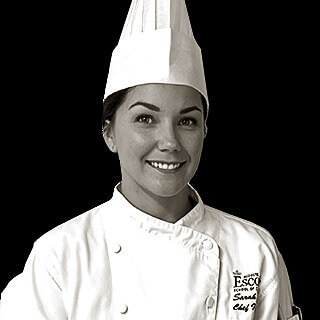BAKING & PASTRY ARTS PROGRAMS
Train with professional Chef Instructors at the Escoffier Boulder, Colorado campus, then apply your knowledge in a professional kitchen with an industry externship.
Explore More Programs
Discover the culinary speciality that’s right for you!
Online Programs
Austin Campus
Boulder Campus
Next start date: Aug 18
Get a well-rounded education at one of the best schools with baking & pastry programs in Colorado*
Studying baking in Colorado can offer a unique and enriching experience for aspiring baking & pastry professionals. Boulder is renowned for its emphasis on sustainability, organic farming, and a healthy lifestyle, which extends into the culinary world. By studying at the Escoffier Boulder campus, you can learn to bake pastries and desserts and also business and career skills for a well-rounded education.
Our campus is surrounded by a vibrant culinary scene, providing opportunities to work directly alongside chefs and bakers who prioritize creativity and craftsmanship.
If you aspire to a baking or pastry career where you can practice time-tested and celebrated culinary techniques, Escoffier Boulder can give you an opportunity to learn theoretical knowledge and gain practical experience to take on your dreams.
Thinking about starting a baking or pastry career? Download our step-by-step Baking & Pastry Career Plan & Checklist.
Did you know?
Colorado has a big sweet tooth!
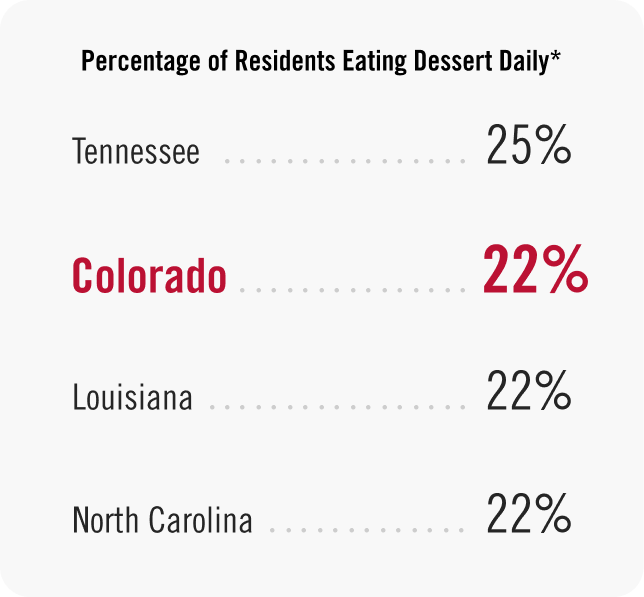
*22% of Coloradans report eating dessert every day. Only residents of Tennessee are likely to eat dessert more frequently, according to The New York Post.
30‑60 weeks
Escoffier’s Boulder baking & pastry programs are designed to work with your schedule. In just half a year or a little more than a year, you could earn a diploma or degree that can set you apart.
54%
The percentage of Escoffier Boulder students who received an income-based federal Pell grant and/or a grant or scholarship from another source, according to the National Center for Education Statistics.
$7,663
For all students, the average amount of aid awarded in the form of federal student loans in 2022-23 was $7,663, according to the National Center for Education Statistics.
Ready to Experience the Baking & Pastry Arts in Boulder?
Boulder Baking & Pastry Classes Can Teach You Practical Business and Career Skills
The Escoffier Boulder campus is designed to help you pursue your dream baking & pastry arts jobs.
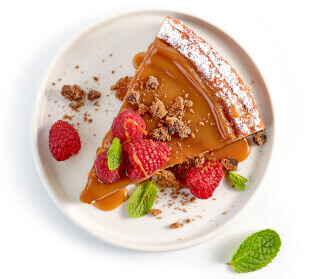
Escoffier’s Boulder campus baking & pastry programs offer students a comprehensive and hands-on learning environment. The campus location of Boulder helps ensure that you can have access to locally-sourced ingredients that allow you to hone your craft with quality produce and sustainable options.
In Boulder, you’ll also have the opportunity to learn directly from industry-experienced Chef Instructors who are passionate about passing on their baking tips and skills to help you thrive as a student and professional.
Our emphasis on a well-rounded pastry education can help open doors for students to a diverse range of baking and pastry careers including becoming an assistant pastry chef, bakery manager, cake designer, and more.
- Attend the beautiful Escoffier Boulder, Colorado campus
- Receive personalized feedback from Boulder Pastry Chef Instructors
- Get baking & pastry job search, interview, and career preparation assistance
- Access to alumni mentorship and employer partner network
The Fundamentals of Baking and Pastry begins with course work concentrating on food safety and sanitation in the professional kitchen. The importance of proper hygiene, food handling and storage, cleaning, pest control and HACCP in a food service operation is explored.
The course includes baking and pastry mixing methods and ingredient identification. The framework to understand the principles of the following cooking and baking techniques are taught: classic pastry doughs, pâte à choux, fried doughs, pies and tarts, baked custards and stove top custards, quick breads, scones, muffins, cookies, brownies and bars, as well as dessert sauces.
Patisserie begins with learning the classic meringue techniques that lead into the creation of European buttercreams. Students will learn classic mixing methods and piping skills. Specialty dessert cakes and decorated special occasion cakes are a major focus of this course work concentrating on factors related to the baking industry. Frozen desserts and plating are focused in this course.
The course includes hand modeling techniques using rolled fondant, gum paste, marzipan, and modeling chocolate. The framework to understand the principles and techniques in the construction of putting together a wedding cake are also covered. Pastry and baking production timelines are examined in this course.
Finally, students are introduced to sugar cookery and fresh fruit dessert items. This course provides instruction, examples, and guidance in the following areas: decorating classic European cakes, rolled fondant designed cakes, hand iced specialty cakes, ice cream and sorbet, candied fruit, gum paste flowers, marzipan and modeling chocolate.
Artisan Bread provides the framework to understand the principles of the following methods and techniques: the methods of pre-fermentation, biga, and sponge, starting and maintaining a variety of sourdough starters, extended fermentation, the 10 steps of bread production, proper shaping, proofing and scoring, whole grain breads, Italian artisan breads, enriched breads, and special occasion/ holiday breads, puff pastry and laminated dough.
Students will study the proper techniques in buying, storing and melting chocolate, chocolate tempering, chocolate candies, truffles and pralines, nut based candies, cooked sugar based candies and sugar art showpiece design and execution, chocolate molding, chocolate finishing techniques, chocolate decorations, amenity design and execution, chocolate showpiece design and execution.
This course highlights modern considerations in the baking industry. Trends in diets and eating habits are constantly changing, and being able to stay on top of them is a key industry skill. Students also learn about cutting-edge trends in dessert composition and contemporary plating techniques, and how to stay current with those. In addition, the course explores different regions’ desserts, as well as their cultural significance and the historical influences that produced them.
This course provides opportunities for real life experiences in an operational restaurant or related business and builds on the skills and techniques covered in previous courses. In the course, students apply the skills they’ve learned in practical ways to real-world situations. Students gain hands-on experience in the kitchen that mirrors their future work in the industry and develop the skills necessary for a culinary career. Immersion in a work environment also allows students to develop industry contacts and build working relationships.
The Fundamentals of Baking and Pastry begins with course work concentrating on food safety and sanitation in the professional kitchen. The importance of proper hygiene, food handling and storage, cleaning, pest control and HACCP in a food service operation is explored.
The course includes baking and pastry mixing methods and ingredient identification. The framework to understand the principles of the following cooking and baking techniques are taught: classic pastry doughs, pâte à choux, fried doughs, pies and tarts, baked custards and stove top custards, quick breads, scones, muffins, cookies, brownies and bars, as well as dessert sauces.
This course explores different types of menus and their applications. The course covers all aspects of menu planning and design, ranging from visual design to price analysis to making use of available resources. The menu is both a financial tool and a communication tool, and its use as both is explained. Students learn about both food and beverage menus.
The Business & Professional Communications course emphasizes the principles and practical application of effective professional communication behaviors within professional, business, and organizational contexts. In addition to identifying the importance of effective communication skills to the hospitality industry, communication styles and effective listening methods are addressed.
Students will create and present oral presentations including cooking demonstrations, and special occasion speaking. Listening skills, verbal and nonverbal communication, conflict resolution, cultural differences in communication, and debate techniques are also covered.
Patisserie begins with learning the classic meringue techniques that lead into the creation of European buttercreams. Students will learn classic mixing methods and piping skills. Specialty dessert cakes and decorated special occasion cakes are a major focus of this course work concentrating on factors related to the baking industry. Frozen desserts and plating are focused in this course.
The course includes hand modeling techniques using rolled fondant, gum paste, marzipan, and modeling chocolate. The framework to understand the principles and techniques in the construction of putting together a wedding cake are also covered. Pastry and baking production timelines are examined in this course.
Finally, students are introduced to sugar cookery and fresh fruit dessert items. This course provides instruction, examples, and guidance in the following areas: decorating classic European cakes, rolled fondant designed cakes, hand iced specialty cakes, ice cream and sorbet, candied fruit, gum paste flowers, marzipan and modeling chocolate.
Foodservice Math & Accounting introduces students to managerial accounting concepts and explains their applications to specific operations within the hospitality industry. Emphasis is placed on how to administer accounting procedures to minimize costs and maintain a full range of customer services.
After summary of the fundamentals of culinary math, an overview of basic business accounting transactions is covered including asset/liability accounts such as accounts receivable and payable, ledgers, balance sheets, payroll and financial statements.
Three out of five foodservice operations fail within five years of opening, often due to money mismanagement; this course gives students the skills to not only keep their restaurant in business but also turn a profit.
This course introduces students to purchasing, receiving, inventory management and menu pricing. Students learn how to minimize costs and maintain a full range of customer services.
The course progresses from the fundamentals of culinary math into an overview of storeroom operations, inventory, portion control, as purchased and edible portions, ingredient conversions, and recipe costing.
Artisan Bread provides the framework to understand the principles of the following methods and techniques: the methods of pre-fermentation, biga, and sponge, starting and maintaining a variety of sourdough starters, extended fermentation, the 10 steps of bread production, proper shaping, proofing and scoring, whole grain breads, Italian artisan breads, enriched breads, and special occasion/ holiday breads, puff pastry and laminated dough.
Students will study the proper techniques in buying, storing and melting chocolate, chocolate tempering, chocolate candies, truffles and pralines, nut based candies, cooked sugar based candies and sugar art showpiece design and execution, chocolate molding, chocolate finishing techniques, chocolate decorations, amenity design and execution, chocolate showpiece design and execution.
Throughout history, food has done more than just provide nourishment. From prehistoric times to the present day, food and the pursuit of it has had a transformative role in human history. Food has impacted societal organization, industrial development, military conflict, and economic expansion.
As epicure and gastronome, Jean-Anthelme Brillat-Savarin stated, “Gastronomy governs the whole of human man.” In addition, food also serves a role in the cultural development of religion, economics, and politics. This course examines the role of food and its contribution and influence over history, culture, religion, economics, and politics.
Food customs and attitudes are also explored, as well as, the social awareness selected food patterns and customs.
This course covers the different types of commercial food service operations, and how to manage each using the principles of good service. Students study the hierarchy of management in food service, and the skills needed to succeed as a manager: training employees, motivating them, disciplining them, and creating a safe and positive work environment. The course also explores how to act responsibly and make decisions that benefit the company.
Technical Writing for the Hospitality Industry, prepares students to write in the hospitality and foodservice professions. In a professional setting, writing provides readers information they need in a format they can understand.
Unlike most academic writing, in which students demonstrate their learning to a professor who already knows the subject, in technical communication the writer is the expert, and the readers are the learners. In the hospitality and foodservice industries, students and professionals write a variety of documents for supervisors, colleagues, and customers such as explaining a problem or product, preparing a proposal, or illustrating a project. This course teaches students to adapt their writing to different audiences and purposes.
This course outlines strategies for making subjects clear to readers who need to understand them. To communicate effectively with an audience, writing must meet rigorous editing standards, in addition to writing in a clear, concise style and presenting information logically.
This course highlights modern considerations in the baking industry. Trends in diets and eating habits are constantly changing, and being able to stay on top of them is a key industry skill. Students also learn about cutting-edge trends in dessert composition and contemporary plating techniques, and how to stay current with those. In addition, the course explores different regions’ desserts, as well as their cultural significance and the historical influences that produced them.
In the Science of Nutrition course, the basic principles of nutrition are investigated. Emphasis is placed on the nutrients, food sources, and their utilization in the body for growth and health throughout life. Contemporary and global nutritional issues are also discussed.
This course covers such topics as business planning, pricing, credit management, government regulation, legal concerns, and business ethics. Students learn how to manage and how to lead. For the final project for this course, the student will complete and present a business plan for a food service operation.
This course provides opportunities for real life experiences in an operational restaurant or related business and builds on the skills and techniques covered in previous courses. In the course, students apply the skills they’ve learned in practical ways to real-world situations. Students gain hands-on experience in the kitchen that mirrors their future work in the industry and develop the skills necessary for a culinary career. Immersion in a work environment also allows students to develop industry contacts and build working relationships.
This course provides opportunities for real life experiences in an operational restaurant or related business and builds on the skills and techniques covered in previous courses. In the course, students apply the skills they’ve learned in practical ways to real-world situations. Students gain hands-on experience in the kitchen that mirrors their future work in the industry and develop the skills necessary for a culinary career. Immersion in a work environment also allows students to develop industry contacts and build working relationships.
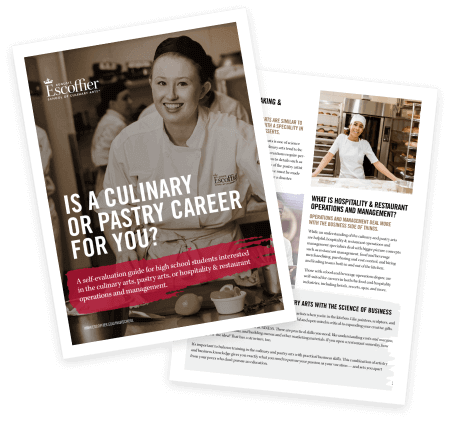
Participating in a practical externship at a bakery or restaurant can provide you with the mentorship and hands-on experience necessary to pursue your career in the baking and pastry arts
Whether you’re looking to work as a head baker, develop new recipes, or start a baking business from home, your externship can give you the opportunity to work toward your goals in a professional kitchen.
The externship class allows students—even those with no prior experience—to get their foot in the door. Once they gain that valuable experience, it is easier for them to determine which path they want to take with their careers.”*
Explore Options to Help You Afford to Attend Baking and Pastry Program in Boulder, Colorado
*59% of Boulder students who entered postsecondary education for the first time received some financial assistance in 2022-23 for those who applied and qualified,
College Navigator, National Center for Education Statistics
The average net price was $11,554 for grant or scholarship aid for students in the largest program for the time in academic year 2022-23.*
*College Navigator, National Center for Education Statistics
Program Cost: $39,365†
Program Length: 60
weeks
Program Cost: $19,569†
Program Length: 30
weeks
†Total program cost includes tuition, uniforms (non-refundable), toolkit, and an optional non-refundable technology fee. The Associate of Occupational Studies Degree in Baking & Pastry cost also includes non-refundable coursepacks. The cost of books is not included. Students may choose to purchase books when enrolling. For more cost details, see the catalog.
Academic weeks required to complete the degree or diploma program.
Hours per week recommended for academics and school-related activities, depending on the student’s learning style.
Approximate time required to complete an online application. Apply today!
Learn baking techniques amongst stunning natural surroundings in Boulder, CO
The city of Boulder continues to push boundaries in it’s culinary practices. Explore how you can make the most out of your time studying in this dynamic city:
Shop at Local Farmers’ Markets
Boulder students are at the center of vibrant farmers’ markets, gaining access to fresh and organic ingredients to elevate your baking and pastry creations.
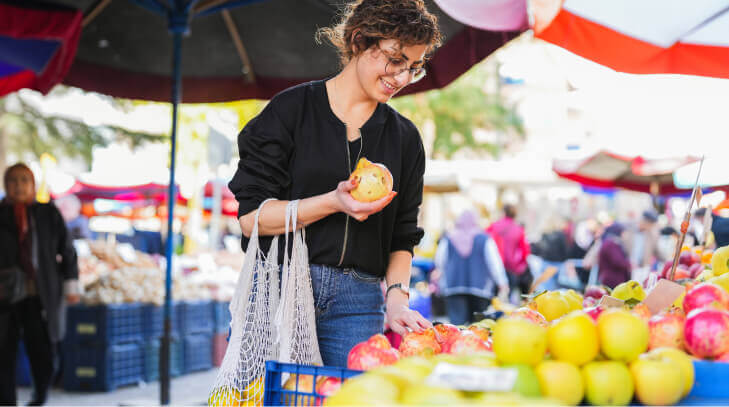
Explore Artisan Bakeries
Boulder boasts a thriving artisan bakery scene, providing opportunities for industry externships and learning from other industry professionals.
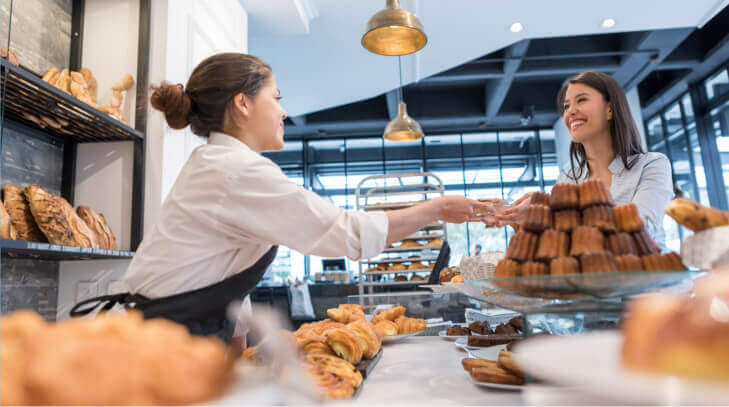
Enjoy Inspiring Natural Beauty
As a student, you can enjoy an environment that stimulates creativity and provides a serene backdrop for your studies with Boulder’s breathtaking mountain landscapes and outdoor recreational opportunities.

Looking to call Colorado home?
Escoffier Boulder students can choose from housing options that are comfortable and convenient
While we don’t provide on-campus student housing, we collaborate with a select housing provider in the Boulder, Colorado region. You have the option to select from apartment complexes to dorm-style lodgings. We’re here to help you find a home you love!
Need a place to live in Boulder?
Explore a variety of options from our select
housing partner.
The Escoffier Boulder Campus is Accredited and Respected Worldwide
The reputation of the institution where you earn your degree or diploma is an important measure of value. The Escoffier Boulder school is accredited by the Accrediting Council for Continuing Education & Training (ACCET) and is approved and regulated by the Colorado Department of Higher Education, Division of Private Occupational Schools.
BEST BAKING & PASTRY ARTS
The Boulder campus is #7 for best baking & pastry arts per College Factual 2024
Nationally Accredited school
Accredited by the Accrediting Council for Continuing Education and Training (ACCET)
*Based on comparable student population data for Austin and Boulder as currently reported in Integrated Postsecondary Education Data System (IPEDS).
There are so many moments that I see as valuable parts of my journey in both programs, but something that has always been very special to me is the support of my fellow classmates, the amazing staff and instructors. I will be forever grateful for this.”*
*This information may not reflect every student’s experience. Results and outcomes may be based on several factors such as geographical region or previous experience.
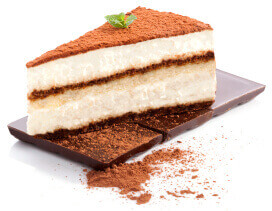
Meet Your Escoffier Boulder Baking and Pastry Chef Instructors
Our Escoffier Boulder instructors don’t just teach; they inspire you to pursue personal growth, continually encouraging you to strive for your best self. They’re determined to support you in any challenges you may face on your baking journey while expanding your culinary creativity in order to craft dishes that fill you with pride.
Our Boulder instructors bring a wealth of industry knowledge, skill, and passion to the classroom, ensuring that you receive quality and practical education in the baking and pastry arts.
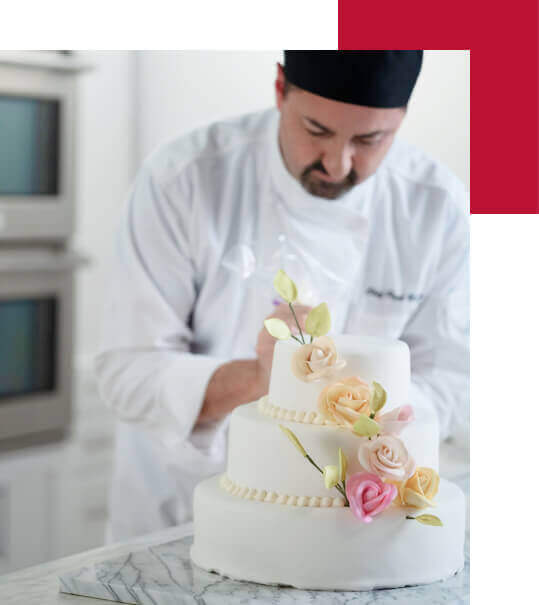
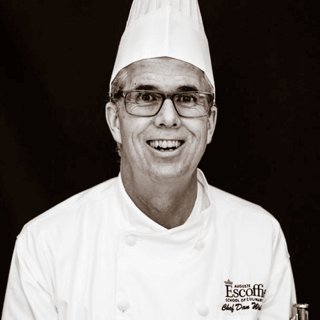
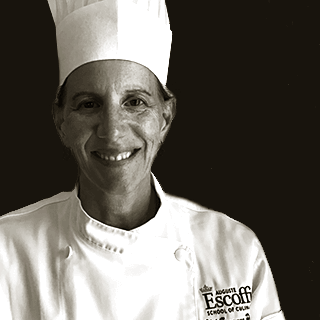
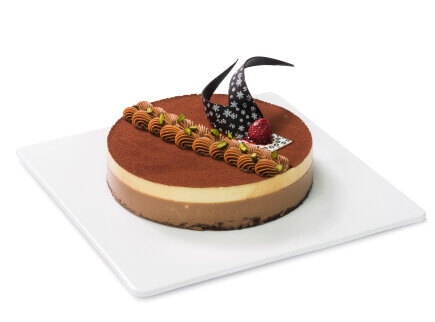
An Escoffier Boulder baking & pastry degree or diploma can help take your career to new heights
Studying baking and pastry in Boulder offers the unique opportunity to blend your baking skills with the city’s sustainable culinary practices, developing a well-rounded, socially-conscious approach to baking. This combination not only enriches your culinary knowledge but also can help prepare you for a career in the Colorado baking and pastry industry and beyond.
Attending school at Escoffier Boulder also helps provide you with a golden opportunity to network and connect with seasoned professionals in the city’s thriving culinary scene. Building these relationships can lead to valuable externships, mentorships, and job opportunities, ultimately helping to propel your career forward.
Unfilled Jobs
The commercial baking industry is facing a significant workforce shortage. By 2030, projections suggest that there could be a shortfall of 53,500 jobs, with a ripple effect throughout the supply chain.*
*American Bakers Association Warns of Looming Workforce Shortage, America Bakers Association
EXAMPLE Job Titles
- Baker
- Pastry Cook
- Assistant Pâtisserie Chef
- Pastry Assistant
- Bakery Manager
- Chocolatier
- Bakery Café Cook
- Dessert Food Truck Cook
- Boutique Baker
- Home Bakery Owner
- Cake Decorator
- Recipe Developer
EXAMPLE Boulder employers
- Bakeries
- Cafés & Coffee Shops
- Restaurants
- Supermarkets
- Catering Companies
- Food Magazines & Blogs
- Dessert Boutiques
- Food Trucks
- Chocolate Shops
- Resorts & Spas
- Retirement Communities
Some Esteemed Employers that Have Hired Escoffier Graduates

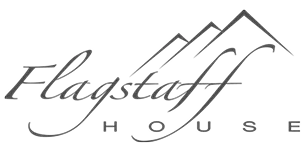
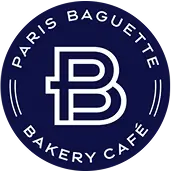
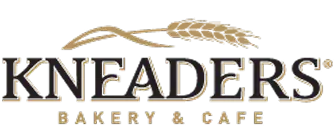
EXPLORE CAREERS AND EXTERNSHIPS IN OUR CAREER CENTER WITH THE HELP OF OUR BOULDER CAREER SERVICES SPECIALISTS
Get “insider knowledge” on how you can uncover career opportunities with our employer partners.
Career Planning
Resume and Portfolio Assistance
Interview Preparation
Escoffier Boulder Admissions Requirements
Escoffier Boulder admissions requirements include a high school diploma or general equivalency diploma (GED). You do not need any specific work experience, nor do you have to take the ACT or SAT to be admitted to any program at Escoffier. For more information, see our catalog.

Frequently Asked Questions About Our Boulder Baking and Pastry Arts Programs
Do I need a high school diploma or GED for pastry school in Colorado?
To be considered for baking and pastry school in Colorado, you need to have proof of high school completion or equivalent. This must be obtained through one of the following prior to the expected start date:
- High school diploma or transcript
- High school equivalency exam: GED, HiSet, or TASC
- Documentation demonstrating that the student has passed a state-authorized examination that the state recognizes as the equivalent of a high school diploma
- Official college transcript from a completed Associate or higher degree program from an accredited institution
- 60 completed college semester credits or 90 completed college quarter credits from one accredited institution, or
- Homeschool documentation as required by local and or state agencies, not limited to the following: notification to the required agency, academic transcripts, and proof of graduation
- DD-214 for U.S. veterans, which reflects high school equivalency
What if I’m an international student living outside of the U.S.?
If you live outside of the U.S. and are interested in our baking & pastry programs at the Boulder,Colorado campus, we’re here to help! Visit our International Students page to learn about admissions, visa support, and everything you need to get started.
How much does pastry school in Colorado cost?
The total program cost for the Diploma in Pastry Arts program at the Escoffier Boulder campus is $18,094, while the total cost for the Associate of Occupational Studies Degree in Baking & Pastry program at Escoffier Boulder is $36,740.*
*Total program cost includes tuition and equipment & supplies. The Associate of Occupational Studies Degree in Baking & Pastry total program cost also includes course packs. The cost of books is not included. Students may choose to purchase books when enrolling. For more cost details, see the catalog.
Financial aid is available for those who apply and qualify.
For all students, the average amount of aid awarded in the form of federal student loans in 2022-23 was $7,663, according to the National Center for Education Statistics.
Could I learn pastry and culinary arts at the Boulder, CO campus?
Yes, you could learn both baking and cooking skills as part of the curriculum at the Boulder, CO campus. The school offers comprehensive programs that cover a wide range of culinary techniques, including baking, pastry arts, and cooking. You can explore fundamental skills as well as additional industry standard techniques that can prepare you for a career in the culinary industry.
Does the Boulder campus have dorms?
While on-campus student living is not available, Escoffier collaborates with a housing partner in the Boulder, CO area. Whether you prefer apartment complexes or dorm-style accommodations, we are here to assist you with your housing search.
Could I learn French pastry techniques at the Escoffier baking program in Colorado?
Yes, French pastry techniques are a foundational part of the Escoffier baking and pastry program. Our curriculum includes a focus on classic French pastry methods, such as creating delicate pastries, croissants, and intricate dessert presentations.
What do I need to prepare for baking and pastry school in Colorado?
To prepare for a pastry program at Auguste Escoffier School of Culinary Arts in Boulder, it would be helpful to consider taking the following steps:
- Review your acceptance packet in the mail.
- Apply for Financial Aid and scholarships to see if you qualify.
- Find housing with one of our local partners.
- Attend New Student events at the campus to get to know your peers and Chef Instructors.
- Connect and share with other students and alumni on social media and get involved in your new culinary community.
Do I need to be a Colorado resident to attend Escoffier at the Boulder campus?
No, you do not need to be a Colorado resident to attend Auguste Escoffier School of Culinary Arts at the Boulder campus. The school welcomes students from all over the country and internationally. The Boulder, CO campus is approved to issue international students a Form I-20. After you receive the Form I-20 and register in SEVIS, you may apply at a U.S. Embassy or Consulate for a student (F or M) visa.
What makes Escoffier one of the top culinary schools in Colorado?
Escoffier is recognized as a top culinary school in Colorado* due to its comprehensive curriculum, experienced faculty, hands-on learning approach, and industry connections. The school’s program covers all aspects of baking and pastry arts, taught by experienced Chef Instructors. With access to state-of-the-art facilities and training, you will gain practical experience to help you perform in the culinary industry.
*2025 Best Colleges with Baking and Pastry Arts Degrees in Colorado, Niche
What degree do I need to be a pastry chef in Colorado?
To become a pastry chef in Colorado, formal education is not always required, but it can be extremely beneficial for gaining the necessary skills and knowledge. Many pastry chefs complete a baking & pastry degree before working in the industry. While Escoffier does not guarantee that students will obtain a chef position post graduation, by enrolling in a baking & pastry program at Escoffier, students can gain experience through externships and network with professional Chef Instructors to help open up job opportunities in the baking & pastry industry.
Does financial aid cover baking and pastry school in Colorado?
Yes, financial aid is available in Colorado to those who apply and qualify. For all students, the average amount of aid awarded in the form of federal student loans in 2022-23 was $7,663, according to the National Center for Education Statistics. Learn more about how our staff can help guide you through the financial aid process.
Does baking and pastry program at Escoffier Boulder qualify for military tuition assistance?
Yes, Escoffier offers financial assistance to military, veterans, and certain family members who apply and qualify. Opportunities include Military Tuition Assistance, the Yellow Ribbon Program, MyCAA, and more.
Is Escoffier's Boulder campus a Colorado baking and pastry school?
Escoffier’s Boulder campus offers baking and pastry programs, but the classification for our institution is as a “culinary school.” This is because we offer many programs in the culinary arts in addition to baking & pastry. There are, however, likely to be many similarities between our offerings and those of institutions classified as pastry schools in Colorado and elsewhere.

Explore the delicious world of pastries in the culinary hub of Escoffier Boulder, Colorado

